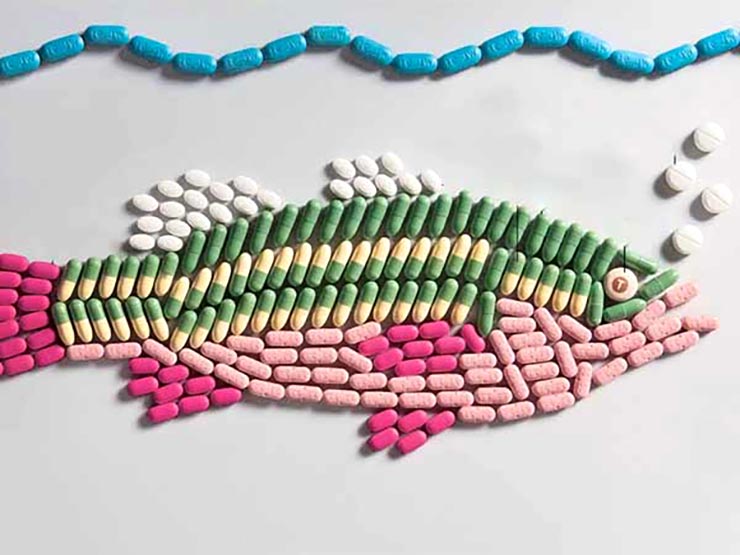Bangladesh, with its agro-based economy, relies heavily on freshwater aquaculture to bridge protein deficits, combat malnutrition and drive economic growth through job creation and foreign exchange gains. However, the flourishing aquaculture industry faces significant challenges, with disease emerging as a major impediment to fish output, particularly in rural areas. Additionally, inadequate water quality management practices, coupled with limited farmer knowledge, pose serious threats to the sustainability of the aquaculture sector.
Disease Challenges in Rural Freshwater Aquaculture
The prevalence of diseases such as epizootic ulcerative syndrome (EUS), fungal infections, and parasite disorders has escalated in Bangladeshi fish farms. Tail and fin rot disease is gaining prominence, further complicating the landscape for rural aquaculture. This rise in diseases is exacerbated by the lack of awareness and knowledge among farmers regarding water quality management.
Water Quality Management in Aquaculture: A Crucial Element
Effective disease prevention in aquaculture hinges on precise water quality management. Maintaining optimal conditions for fish health requires a delicate balance of nutrients and elements, which many farmers struggle to achieve. A lack of understanding of water quality standards results in inadequate pond suitability assessments for fish or shrimp farming. Farmers often resort to reactionary measures, such as the use of pesticides, lime, antibiotics, or modifying water parameters, leading to an unsustainable approach.
Over reliance on Antibiotics and Aqua-Chemicals
Research conducted in Bangladesh’s Rajshahi area revealed a concerning trend among fish farmers. Despite the widespread use of antibiotics and aqua-chemicals, 88% of farmers lacked adequate understanding of these substances, and 81% were unaware of appropriate chemical dosages. Indiscriminate use of aqua-chemicals poses long-term risks to human health and the environment, as 72% of fish farmers were oblivious to these potential impacts.
Hatcheries and Hormone Usage
While hatcheries exhibit better control over fish health due to intensive or semi-intensive methods, hormone usage poses another threat. Induced breeding techniques, which involve injecting hormones for reproduction stimulation, have become prevalent in over a thousand hatcheries across Bangladesh. The use of hormones for sex reversal and artificial reproduction may enhance growth rates but raises concerns about potential negative effects on human and environmental health.
Industrial Effluents and Environmental Threats
Beyond aquaculture, untreated industrial waste and wastewater present a threat to wild fisheries resources. Around 200 rivers in Bangladesh receive a significant volume of industrial effluents daily, contaminating ground and surface water with lead, cadmium, arsenic, and chromium. This pollution not only endangers aquatic life but also raises questions about the safety of consuming locally caught fish and shellfish.
Ensuring Sustainable Aquaculture
Addressing the multifaceted challenges facing Bangladesh’s aquaculture industry requires a holistic approach. Firstly, raising awareness among rural farmers about proper water quality management is crucial. Training programs and outreach initiatives can equip them with the knowledge to maintain ideal pond conditions and prevent disease outbreaks.
Moreover, there is a pressing need for education on the responsible use of antibiotics and aqua-chemicals. Farmers must understand the potential long-term impacts on human health and the environment, encouraging the adoption of alternative preventive methods.
Hatcheries, while vital for fish seed production, should explore sustainable alternatives to hormone usage. Research and development initiatives can focus on identifying practices that ensure robust fish health without compromising human and environmental safety.
What We Are Doing
Recognizing the risks associated with the indiscriminate use of antibiotics and aqua-chemicals, FishByte is spearheading awareness campaigns. These campaigns emphasize the long-term impacts on human health and the environment, encouraging farmers to adopt alternative preventive methods and sustainable practices.
Sustainable freshwater aquaculture is essential for Bangladesh’s economic growth, food security, and public health. To achieve this, a concerted effort is required to address the challenges posed by diseases, inadequate water quality management, and the indiscriminate use of chemicals. By empowering rural farmers with knowledge, promoting responsible chemical usage, and implementing stringent environmental regulations, we can ensure a thriving aquaculture sector that benefits both our economy and the well-being of us.
